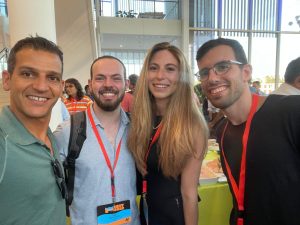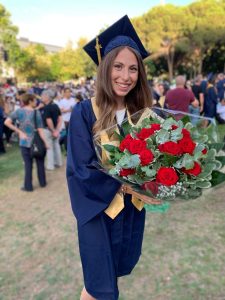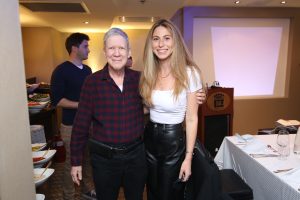Unconventional
Daniella Bar-Lev, a Computer Science PhD student, is researching DNA-based information storage – an approach that's expected to replace standard memory devices in the future
Twenty-nine-year-old Daniella Bar-Lev was drawn to mathematics in high school where she studied in a class for gifted teens, while at the same time taking courses at the Open University. “In these courses, I was exposed to mathematics beyond the calculus that you study in high school, and I realized that this is the field I would like to pursue,” Daniela explained. “When I enrolled at the Technion, the well-known warning that ‘you can’t do anything with a mathematics degree’ echoed in my head, so I enrolled in both mathematics and computer science, in order to get a taste of both fields and choose the one I liked best. I came to realize that I loved the connection between the two, and completed a double degree.”
Daniella was raised in Ashdod, where she continues to live today with her partner. Her parents immigrated from the Soviet Union in the 1970s. Her mother worked for many years in the finance department at the Wolfson Medical Center in Holon and her – father at the Ackerstein brick factory in Ashdod. “Neither of them is a computer person, the love for the field is something I developed on my own,” Daniella recalled. The choice to pursue higher education wasn’t trivial either. “There are no universities in Ashdod, so academia doesn’t have a presence in one’s daily experience. Nonetheless, here I am, after my bachelor’s and master’s degrees and in the middle of my doctoral studies.”
She completed her bachelor’s degree with commendable honors as part of “LAPIDIM” – the Faculty of Computer Science’s excellence program, designed to train future leaders in the hi-tech industry. Towards the end of her degree, Daniella started working as a teaching assistant at the Henry and Marilyn Taub Faculty of Computer Science. Among other things, she tutored her younger sister, also a student at the faculty.
It was already clear to her then that she wanted to earn a master’s degree, but the search for an advisor was not bearing fruit. Eventually, she began to look for advisors at other universities. However, a meeting with Prof. Shaul Markovitch, who was the faculty vice dean for undergraduate studies at the time, changed her course.
“He strongly suggested that I speak with Prof. Eitan Yaakobi from the computer science department before making any decisions. I met with Prof. Yaakobi, and he explained his research to me. Shortly after, we continued to a meeting with Prof. Tuvi Etzion, who was Eitan’s advisor for his master’s degree. It was love at first sight, both personally and academically, and I was thrilled when they agreed to be joint supervisors for my master’s degree. The very next day, I began working on my research proposal,” said Daniela.

At the ISIT (International Symposium on Information Theory) conference in Finland with Prof. Eitan Yaakobi and two doctoral students from the group
Daniella’s graduate research, which later evolved into her doctoral thesis, delves into various aspects of DNA storage. This field, which has been developing rapidly in the last decade, explores the potential of using biological material, rather than traditional electronic devices, as a means of information storage. This approach offers several benefits, including the significant miniaturization of storage systems, long-term storage of information 1,000 times longer than in current solutions, and a substantial reduction in both energy and economic costs.
The DNA molecule is composed of four nucleotides, which are organic building blocks denoted by the letters A, C, G, and T. Unlike the binary language of zeros and ones used in current technologies, DNA storage relies on sequences of these four letters to encode information.
To write (that is, to store) the information with this technology, synthesis is required. This is the process of creating the DNA molecules that represent the sequence, and to read the information, sequencing of those molecules is required.
The process of reading information stored in DNA is a complex one, and writing it is even more so. During these processes, errors of various types can occur. These are the main focus of Daniella’s research. “Errors in DNA storage differ significantly from those in typical hardware, which impact the encoding and decoding process as well as the process of retrieving the stored information. This requires the use of mathematical tools, so familiarity with math is required here, a field that I very much enjoy and can contribute to,” Daniella explained.
She emphasizes another aspect that brings her satisfaction in her research work – the knowledge that it can have a significant impact. “When I started my master’s degree, it was considered a promising field. Today, it is already clear to me that this is a field that will change the future. Electronic storage is reaching its limits of capacity in all aspects – physical space, costs, energy, and the environmental impact – and a dramatic alternative is needed, not just minor improvements. I have no doubt that DNA storage is an excellent option, but more work is needed before it can become widely available. Unlike conventional memory, where we know the specific address that we need to access in the hardware, working with DNA is entirely different. It is like a ‘soup’ of molecules. Therefore, I hope that our contribution in the field of error correction will be apparent soon on the applied level as well.”
Her decision to pursue a Ph.D. after completing her master’s degree was solidified during the COVID-19 pandemic. “It was a time of remote work and introspection, and I discussed the idea with Eitan. The smile on his face confirmed that I was on the right track, and more importantly, that I’m good at what I do. This recognition is invaluable because we often struggle to accurately assess ourselves, especially during periods of isolation when we are working from home and spend most of our time alone.”
Daniella’s performance in her master’s thesis paved the way for her acceptance into a direct path towards a doctorate, which she now sees as just the beginning of her academic journey. “I have a passion for both research and teaching, and in my Ph.D. I work closely with graduate students. The academic world is one that I knew very little about until I arrived at the Technion, but it has become clear that this is where I belong. In addition to my academic work, it is also important to me to introduce children and teenagers to this world. I volunteer in elementary schools where I present what I do and what the academic track is like. Through this, I address the common fears among young girls and work to break down gender biases surrounding academia and higher education. I hope that my efforts have a significant impact.”
Throughout her academic journey, Daniella has received numerous scholarships and awards, including the Gutwirth Excellence Scholarship, Faculty Excellence Scholarship, Faculty Persistent Excellent Teaching Assistant Award, the Best Paper Award at a conference, and the Student Research Prize for Cross-PI Collaboration in Data Science. “Daniella is the best student I have ever had,” declares Prof. Yaakobi. “Not only does she help me supervise graduate students, but she also leads my research group while guiding and assisting many students. I’m certain she will become a faculty member and I hope it will be at the Technion.”




